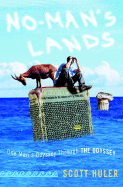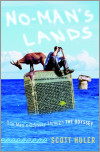
 When Scott Huler, an NPR contributor, swore on the air that he would never read James Joyce's Ulysses, he expected to receive some flak from Bloomsday devotees but not much else. However, he quickly realized the gods had other plans for him. He did read Joyce, which led him to revisit the original Homeric version, studying it with a vigor that rapidly developed into obsession. Soon Huler found himself planning his own journey--one that would retrace (more or less) the path of The Odyssey's eponymous hero. It's the sort of high concept book idea that could easily become too cute or tiresome on the page, but Huler has crafted a highly entertaining memoir/travelogue that doubles as a fresh and surprisingly informative guide to the history and themes of The Odyssey.
When Scott Huler, an NPR contributor, swore on the air that he would never read James Joyce's Ulysses, he expected to receive some flak from Bloomsday devotees but not much else. However, he quickly realized the gods had other plans for him. He did read Joyce, which led him to revisit the original Homeric version, studying it with a vigor that rapidly developed into obsession. Soon Huler found himself planning his own journey--one that would retrace (more or less) the path of The Odyssey's eponymous hero. It's the sort of high concept book idea that could easily become too cute or tiresome on the page, but Huler has crafted a highly entertaining memoir/travelogue that doubles as a fresh and surprisingly informative guide to the history and themes of The Odyssey.Hurrying to complete his trip before the impending birth of his first child and seeking to capture the unpredictable nature of Odysseus's wanderings, Huler stuffed a backpack full of Lonely Planet guides and headed to the Mediterranean with only a general idea of where he would land. This turned out to be a good plan as most of the sites in The Odyssey are geographically vague at best. Nevertheless, Huler found and ate lunch in the Sicilian cave of the Cyclops, pondering that episode's lesson (know when to shut up) and lounged in a Tunisian resort where he surmised that the "lotus eaters" weren't necessarily high, but very relaxed. On Malta, supposed home of Calypso, the sex-crazed nymph who held Odysseus captive for seven years, he pondered the nature of temptation and the longing for home. After a hilarious interlude trying to rent boats in Italy, Huler managed to take a kayak through Scylla and Charybdis without being eaten or drowned. He also gives readers a mini-history of Troy, "the backstory capital of the world," and its famous horse. And in one spooky but enchanting chapter, he recounts his visit to the Roman catacombs--an approximation of Odysseus's voyage to Hades.
It took Odysseus 10 years to return home to Ithaca after his victory at Troy. Huler had but six months to complete the same journey but what he learned about family, ambition and self is deeply thought-provoking--an epic writ small. Perhaps a bigger gift to his readers, though, is the infectiousness of his enthusiasm for one of the greatest stories ever told. No doubt many will be inspired to dust off their copies of The Odyssey and plunge in once again.--Debra Ginsberg

